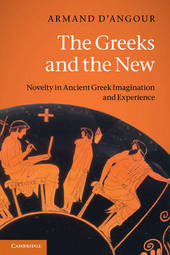
|
The Greeks and the New: Novelty in Ancient Greek Imagination and Experience
Paperback / softback
Main Details
| Title |
The Greeks and the New: Novelty in Ancient Greek Imagination and Experience
|
| Authors and Contributors |
By (author) Armand D'Angour
|
| Physical Properties |
| Format:Paperback / softback | | Pages:276 | | Dimensions(mm): Height 228,Width 152 |
|
| ISBN/Barcode |
9780521616485
|
| Classifications | Dewey:949.5 |
|---|
| Audience | | Professional & Vocational | |
|---|
| Illustrations |
1 Tables, black and white
|
|
Publishing Details |
| Publisher |
Cambridge University Press
|
| Imprint |
Cambridge University Press
|
| Publication Date |
15 September 2011 |
| Publication Country |
United Kingdom
|
Description
The Greeks have long been regarded as innovators across a wide range of fields in literature, culture, philosophy, politics and science. However, little attention has been paid to how they thought and felt about novelty and innovation itself, and to relating this to the forces of traditionalism and conservatism which were also present across all the various societies within ancient Greece. What inspired the Greeks to embark on their unique and enduring innovations? How did they think and feel about the new? This book represents the first serious attempt to address these issues, and deals with the phenomenon across all periods and areas of classical Greek history and thought. Each chapter concentrates on a different area of culture or thought, while the book as a whole argues that much of the impulse towards innovation came from the life of the polis which provided its setting.
Author Biography
Armand D'Angour is Fellow and Tutor in Classics at Jesus College, Oxford. This is his first book.
Reviews'[D'Angour's] knowledge of Greek literature is exhaustive and he has a gift for the apt quotation, so every page glitters with gold nuggets.' The Spectator '[An] engaging and aptly original study.' The Times Literary Supplement '... this is a fascinating, engaging book. D'Angour has demonstrated that the ancient Greeks, in almost every sphere, believed that novelty, change, and newness were not necessarily things that 'just happen'. Rather, as he shows, these phenomena could be seen as the result of human intention, ambition, skill, effort, and ingenuity. In a field that has only recently begun to remember its roots in (and its obligations to) the minds of ancient individuals, D'Angour's The Greeks and the New shows the way forward. Not to be missed.' Bryn Mawr Classical Review
|